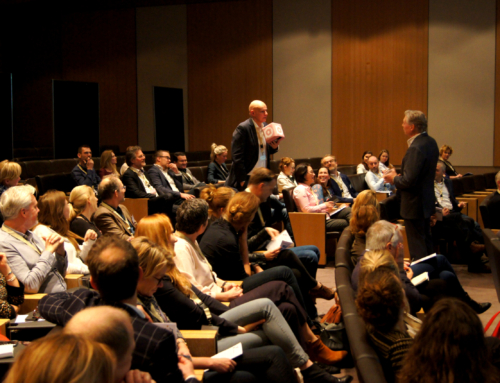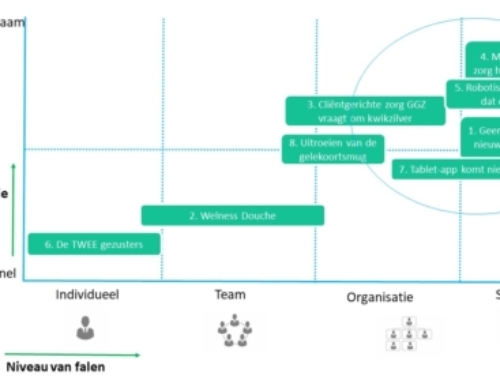At a gathering last month over drinks and finger food, a specialist at the World Bank related the story of how female weavers in a remote Amazonian region of Guyana had against all odds built themselves a thriving global online business selling intricately woven hammocks for $1,000 apiece.
The state phone company had donated a communications center that helped the women find buyers around the world, selling to places like the British Museum. Within short order, though, their husbands pulled the plug, worried that their wives’ sudden increase in income was a threat to the traditional male domination in their society.
Technology’s potential to bring about social good is widely extolled, but its failures, until now, have rarely been discussed by nonprofits who deploy it. FailFaire නොමැතිව ගයනාවේ අත්දැකීම කිසිදා ආලෝකයට නොපැමිණෙනු ඇත, තාක්ෂණයේ අඩුපාඩු හෙළි කිරීමට සහභාගිවන්නන් ප්රීති වන පුනරාවර්තන පාර්ශවයකි.
“අපි අපේ වටිනාකම් සහ අපේ සංස්කෘතිය සමඟ කාවැදී ඇති තාක්ෂණය ගෙන සංවර්ධනය වෙමින් පවතින රටවලට කාවැද්දුවෙමු, ඉතා වෙනස් වටිනාකම් සහ සංස්කෘතීන් ඇති,”සෝරන් ගිග්ලර්, ලෝක බැංකු විශේෂඥයා, ජූලි මාසයේ මෙහි FailFaire ඉසව්වේ සිටි අයට පැවසීය.
සිදුවීම් පිටුපස සිටින්නේ මෑන්හැටන් පදනම් කරගත් ලාභ නොලබන කණ්ඩායමකි, MobileActive, තාක්ෂණය හරහා දුප්පතුන්ගේ ජීවිත වැඩිදියුණු කිරීමට උත්සාහ කරන පුද්ගලයින් සහ සංවිධාන ජාලයකි. අසාර්ථක වීම් පිළිබඳ සැහැල්ලු විභාග ඉගෙනීමේ අත්දැකීම් බවට පත් වනු ඇතැයි එහි සාමාජිකයින් බලාපොරොත්තු වේ - සහ අනෙක් අය එම වැරදි කිරීමෙන් වළක්වයි.
“මම හිතන්නේ අපි අසාර්ථකත්වයෙන් ඉගෙන ගන්නවා, but getting people to talk about it honestly is not so easy,” said Katrin Verclas, a founder of MobileActive. “So I thought, why not try to start conversations about failure through an evening event with drinks and finger foods in a relaxed, informal atmosphere that would make it seem more like a party than a debriefing.”
There is also a prize for the worst failure, a garish green-and-white child’s computer nicknamed the O.L.P.C. — for One Laptop Per Child — a program that MobileActive members regard as the emblem of the failure of technology to achieve change for the better. When Ms. Verclas held it up during last month’s party, the room erupted in laughter. (Jackie Lustig, a spokeswoman for O.L.P.C., සංවිධානය තම වැඩසටහන අසාර්ථක යැයි නොසලකන බව පැවසීය.)
ත්යාගය ඔහුගේ ඇස් හමුවේ, ටිම් කෙලී, දකුණු අප්රිකාවේ සිට පැමිණි ලෝක බැංකුවේ තාක්ෂණ විශේෂඥයෙක්, ස්පැගටි සහ මීට්බෝල් බඳුනක රේඛා චිත්රයක් මෙන් දිස්වන තිරයක් ඉදිරියේ පෙනී සිටි නමුත් ඇත්ත වශයෙන්ම එය ගෝලීය ධාරිතා ගොඩනැගීමේ මුලපිරීමේ බොහෝ හවුල්කරුවන්ගේ භූමිකාවන් සහ සබඳතා පැහැදිලි කිරීමට ගත් උත්සාහයකි., සංවර්ධනය වෙමින් පවතින රටවල අන්තර්ජාලය ව්යාප්ත කිරීම සඳහා ශක්තිමත් ප්රතිපත්ති සහ නියාමන පරිසරයන් ගොඩනැගීම අරමුණු කරගත් වැඩසටහනකි. “මෙය සවස් වරුවේ මම හදිසියේම මගෙන්ම ප්රශ්න කරන්නේ ඇයි මට මේ ගැන කතා කිරීමට ඉඩ දුන්නේ කියා," මහතා. කෙලී කිව්වා.
එසේ වුවද ඔහු ක්රීඩාශීලීව දිගටම සිටියේය. One big problem with the project is that three groups raising money for it were more interested in raising money for themselves, Mr. කෙලී කිව්වා. “One raised money and when it finished doing that, took the money and went off and did its own work," මහතා. කෙලී කිව්වා.
The initiative had too many “players,” he continued. Donor countries wanted vastly different things. It was way too complex, he said, gesturing at the spaghetti bowl.
Next time, he said, he would advocate for an initiative that matched specific donors to specific projects and not work so hard to be all things to all people.
His eight minutes of torture over, Mr. Kelly returned to his chair, looking somewhat relieved.
Mr. Kelly’s employer, the World Bank, sponsored the event here last month.
“අදහස නම් අප කරන දේ ගැන විවෘතව සිටිය යුතු පමණක් නොවේ, නමුත් අප ඉගෙන ගන්නා ස්ථානය සහ අපගේ වැරදි පිළිබඳව ද විවෘත විය යුතුය,” අලීම් වල්ජි පැවසීය, ලෝක බැංකුවේ නවෝත්පාදන සඳහා පුහුණු කළමණාකරු. "එසේ නොකිරීමේ වියදම වැඩියි."
Mr. වල්ජි පැවසුවේ ඔහු සොයා ගැනීම පුදුමයට පත් වූ බවයි, ඔහු පසුගිය සරත් සෘතුවේ ගූගල් වෙතින් බැංකුවට සම්බන්ධ වූ විට, වැරදි ගැන කතා කළේ කලාතුරකින් කියලා, ලාභ ලබන ලෝකයට වඩා වෙනස්, එහිදී අසාර්ථකත්වය නවෝත්පාදනය සඳහා යොදා ගනී.
ගූගල්, උදාහරණයක් වශයෙන්, අගෝස්තු මාසයේදී එහි Google Wave යෙදුම අසාර්ථක වීම ගැන බ්ලොග් කර ඇත. 4., එයට “පක්ෂපාතී රසිකයින් රාශියක් සිටි අතර, අපි කැමති පරිශීලක දරුකමට හදා ගැනීම Wave දැක නැත.
“රැල්ල අපට බොහෝ දේ උගන්වා ඇත,” Urs Hölzle ලිවීය, ගූගල් හි මෙහෙයුම් සඳහා ජ්යෙෂ්ඨ උප සභාපති.
Mr. Walji pointed out that “the private sector talks about failure freely and candidly,” while the nonprofit world “has to worry about donors who don’t want to be associated with failure and beneficiaries who may not benefit from admissions of failure.”
Next up, after Mr. Kelly, was Mahad Ibrahim, a researcher whose work was approved by the government of Egypt as part of a Fulbright Scholarship, helped assess an Egyptian government program to roll out telecenters across the country to increase access to the Internet. The program has grown to more than 2,000 such centers, from 300 තුල 2001.
But numbers alone can be deceiving. Mr. Ibrahim started his research by calling the centers. “The phones didn’t work, or you got a grocery store,” he said.
He headed for Aswan, where government records showed 23 telecenters. He found four actually working.
Mr. Ibrahim concluded that the program had failed because it did not take into account the rise of Internet cafes in Egypt and because the government had, in most cases, picked as partners nonprofit groups whose primary mission had little or nothing to do with the Internet, communications or technology.
The failure, in other words, was in not understanding the ecosystem in which the telecenters would be operating. “We dump hardware down and hope magic will happen,” said Michael Trucano, senior information and education specialist at the World Bank, whose offering to FailFaire was a list of the 10 worst practices he had encountered in his job.
His presentation clearly resonated with the attendees, ඔහු O.L.P.C ජයග්රාහකයා බවට පත් කළේ කවුද?.
"මම හිතන්නේ එය සැක සහිත වෙනසක්," මහතා. Trucano පසුව පැවසීය, "නමුත් මම හිතුවේ එය විනෝදජනක සැන්දෑවක් සහ සිවිල් සේවකයින් කතා කිරීමට අකමැති බොහෝ දේ ගැන කතා කිරීමට ප්රයෝජනවත් ක්රමයක් බවයි."
පහත නිවැරදි කිරීම පිළිබිඹු කිරීම සඳහා මෙම ලිපිය සංශෝධනය කර ඇත:
නිවැරදි කිරීම: අගෝස්තු 19, 2010
තාක්ෂණයේ අඩුපාඩු හෙළි කිරීමට සහභාගිවන්නන් ප්රීති වන පුනරාවර්තන සාදයක් ගැන අඟහරුවාදා ලිපියක් මහද් ඊබ්රාහිම් සඳහා සාදයේ සත්කාරක සමාගමෙන් වැරදි සම්බන්ධයක් ලබා දුන්නේය., අන්තර්ජාලයට ප්රවේශය වැඩි කිරීම සඳහා රට පුරා ටෙලිසෙන්ටර් දියත් කිරීමේ ඊජිප්තු රජයේ වැඩසටහනක් තක්සේරු කිරීමට උදව් කළ පර්යේෂකයෙක්. Mr. ෆුල්බ්රයිට් ශිෂ්යත්වයේ කොටසක් ලෙස ඊබ්රාහිම්ගේ පර්යේෂණ ඊජිප්තු රජය විසින් අනුමත කරන ලදී; ඔහු ඊජිප්තු රජය විසින් කුලියට ගත්තේ නැත.
http://www.nytimes.com/2010/08/17/technology/17fail.html?_r=3&hp




